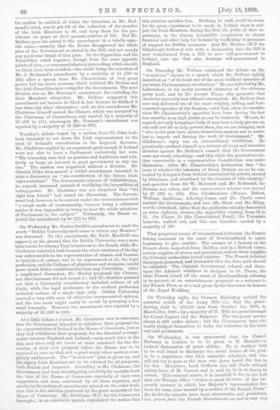On Thursday Mr. Wallace continued the debate on the "
in-and-out " clauses in a speech which Mr. Balfour rightly described as " of its kind one of the most brilliant speeches of my whole Parliamentary recollection." He was followed by Mr. Labouehere, in his newly assumed character of the virtuous party hack, and by Sir Joseph Pease, who possesses that character naturally and without assumption. Mr. Balfour then rose and delivered one of the most weighty, telling, and best- reasoned speeches.of the Session,—and that, when we consider what Mr. Chamberlain's speeches have been during the last two months, is as high praise as can be bestowed. We are, he argued, not only bringing a body of men here to help govern us, who will not let us help govern them, but we are bringing men " who in the past have shown themselves anxious not to assist, but to impede and destroy the work of Government." Mr. Gladstone's reply was an extraordinary exhibition. He practically confined himself to a torrent of irony and invective directed against Mr. Balfour's remark that the Government were not worth attacking,—and this while the greatest revolu- tion conceivable in a representative Constitution was under discussion. After Mr. Chamberlain's declaration that " the issue is whether the interests of Great Britain are to be con- trolled by delegates from Ireland nominated by priests, elected by illiterates, and subsidised by the enemies of this country," and speeches from Sir W. Harcourt and Mr. Redmond, the division was taken, and the omnes-omnia scheme was carried by 27 (325 to 298). Five Gladstonians (Messrs. Bolton, Wallace, Rathbone, Atherley-Jones, and Dr. Clark) voted against the Government, and two (Mr. Shaw and Mr. Illing- worth) abstained. After that the guillotine silently descended on some eighteen clauses, the majorities varying from 33 to 35. On Clause 10 (the Consolidated Fund), the Unionists however, walked out, and this was therefore carried by a majority of 309.


































 Previous page
Previous page